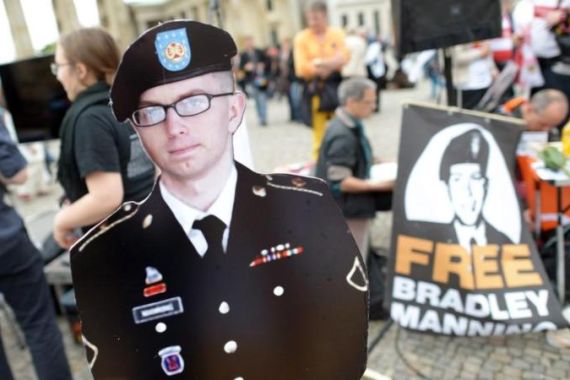Defence rests in Manning Wikileaks trial
Army Private Bradley Manning tells Judge Colonel Denise Lind that he does not want to testify on his own behalf.

The defence has rested its case in the court martial of US Army Private First Class Bradley Manning, accused of passing secrets to the anti-secrecy website WikiLeaks.
Manning, 25, who is charged with leaking more than 700,000 classified files, combat videos and State Department cables to WikiLeaks, told Judge Colonel Denise Lind on Wednesday that he did not want to testify on his own behalf.
Keep reading
list of 4 itemsCanadian Nobel-winning author Alice Munro dies aged 92
King Charles unveils royal portrait
Cannes film festival hopes for ‘no controversies’ as wars, scandals rage
“The defence rests, your honour,” defence attorney David Coombs told the court.
Manning, who allegedly gave secrets to WikiLeaks while serving as an intelligence analyst in Iraq in 2009 and 2010, could face life in prison if convicted of the most serious charge – aiding the enemy.
Defence lawyers had read a statement into the record and elicited testimony from nine witnesses, after initially saying they planned to call 46 witnesses.
Lind, who is both overseeing the case and will hand down a decision, set Monday to hear prosecution arguments.
She has not set a date to announce a decision.
Before ending its case on Wednesday, the defence called its final witness, a Harvard Law School professor who testified that WikiLeaks and its model of decentralised leaking of secrets is a high point in journalism history.
Professor Yochai Benkler, the co-director of the Berkman Center for Internet and Society said WikiLeaks is “a clear distinct component of what in the history of journalism we see as high points, where journalists are able to come in and say, ‘Here’s a system operating in a way that is obscure to the public and now we’re able to shine the light'”.
WikiLeaks provided the materials in 2010 to traditional news outlets that included The New York Times, Britain’s Guardian and Germany’s Der Spiegel.
The publications were able to vet the material and provide greater distribution for it, Benkler said.
The 21 charges against Manning include espionage, computer fraud and, most seriously, aiding the enemy by disclosing material that could be used by the al-Qaeda network.
The prosecution rested last week after five weeks of testimony, some in closed session. The trial is scheduled to end
by August 23.